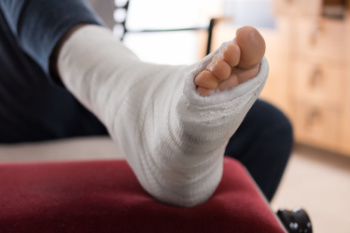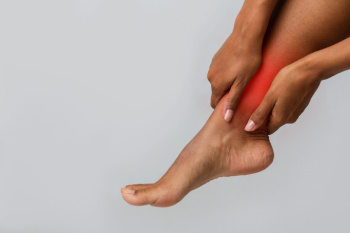
The feet are essential yet often overlooked parts of our body. With 26 bones, 33 joints, and a network of nerves and blood vessels, they provide the stability and balance necessary for every step you take. When issues arise, whether it is discomfort or more serious conditions, the pain can be intense and disrupt daily life. This is particularly true for those with diabetes, as foot complications can quickly escalate into severe problems. Ignoring foot health can lead to chronic pain, mobility problems, and even severe conditions like infections or deformities. Wearing shoes that fit properly and taking time for foot care are key to preventing these issues. A podiatrist can help diagnose foot problems early and offer solutions, from custom orthotics to treatment for existing conditions. They can guide you in maintaining healthy feet and prevent further complications. If you are dealing with foot pain or other issues related to your feet, it is suggested that you make an appointment with a podiatrist.
Everyday foot care is very important to prevent infection and other foot ailments. If you need your feet checked, contact one of our podiatrists from The Sun Healthcare & Surgery Group. Our doctors can provide the care you need to keep you pain-free and on your feet.
Everyday Foot Care
Often, people take care of their bodies, face and hair more so than they do for their feet. But the feet are a very important aspect of our bodies, and one that we should pay more attention to. Without our feet, we would not be able to perform most daily tasks.
It is best to check your feet regularly to make sure there are no new bruises or cuts that you may not have noticed before. For dry feet, moisturizer can easily be a remedy and can be applied as often as necessary to the affected areas. Wearing shoes that fit well can also help you maintain good foot health, as well as making it easier to walk and do daily activities without the stress or pain of ill-fitting shoes, high heels, or even flip flops. Wearing clean socks with closed shoes is important to ensure that sweat and bacteria do not accumulate within the shoe. Clean socks help to prevent Athlete’s foot, fungi problems, bad odors, and can absorb sweat.
If you have any questions please feel free to contact our offices located in Antioch, Martinez, and Concord, CA . We offer the newest diagnostic and treatment technologies for all your foot and ankle needs.

A broken ankle can cause significant discomfort and mobility issues. One of the most noticeable symptoms is intense pain, which often worsens with movement or pressure. Swelling and bruising surrounding the ankle are common due to internal bleeding and inflammation. In severe cases, joint deformity may be present, indicating a misalignment of the bones. Many individuals with a broken ankle find it impossible to bear weight on the affected foot, as any attempt to stand or walk can cause extreme pain. The area may also feel tender to the touch, and the skin might appear discolored. If you have fallen and have any of the above symptoms, it is suggested that you promptly contact a podiatrist who can provide an accurate diagnosis and offer appropriate treatment solutions.
Broken ankles need immediate treatment. If you are seeking treatment, contact one of our podiatrists from The Sun Healthcare & Surgery Group. Our doctors can provide the care you need to keep you pain-free and on your feet.
Broken Ankles
A broken ankle is experienced when a person fractures their tibia or fibula in the lower leg and ankle area. Both of these bones are attached at the bottom of the leg and combine to form what we know to be our ankle.
When a physician is referring to a break of the ankle, he or she is usually referring to a break in the area where the tibia and fibula are joined to create our ankle joint. Ankles are more prone to fractures because the ankle is an area that suffers a lot of pressure and stress. There are some obvious signs when a person experiences a fractured ankle, and the following symptoms may be present.
Symptoms of a Fractured Ankle
- Excessive pain when the area is touched or when any pressure is placed on the ankle
- Swelling around the area
- Bruising of the area
- Area appears to be deformed
If you suspect an ankle fracture, it is recommended to seek treatment as soon as possible. The sooner you have your podiatrist diagnose the fracture, the quicker you’ll be on the way towards recovery.
If you have any questions, please feel free to contact our offices located in Antioch, Martinez, and Concord, CA . We offer the newest diagnostic and treatment technologies for all your foot care needs.

Gout is a type of inflammatory arthritis that can cause sudden, intense pain, often affecting the big toe joint. It occurs when uric acid builds up in the bloodstream and forms sharp crystals in the joints. A gout flare can come on quickly, causing redness, swelling, and tenderness, sometimes so severe that even the weight of a bedsheet feels unbearable. While gout attacks can be short-lived, the condition may return and worsen over time if left untreated. Management typically includes medications to reduce inflammation during a flare-up and long-term strategies to lower uric acid levels. Lifestyle changes such as maintaining a healthy weight, limiting alcohol, and reducing intake of purine-rich foods, like red meat and seafood, can help to prevent future attacks. If you are experiencing joint pain or think you might have gout, it is suggested that you schedule an appointment with a podiatrist for an accurate diagnosis and a personalized treatment plan.
Gout is a foot condition that requires certain treatment and care. If you are seeking treatment, contact one of our podiatrists from The Sun Healthcare & Surgery Group. Our doctors will treat your foot and ankle needs.
What Is Gout?
Gout is a type of arthritis caused by a buildup of uric acid in the bloodstream. It often develops in the foot, especially the big toe area, although it can manifest in other parts of the body as well. Gout can make walking and standing very painful and is especially common in diabetics and the obese.
People typically get gout because of a poor diet. Genetic predisposition is also a factor. The children of parents who have had gout frequently have a chance of developing it themselves.
Gout can easily be identified by redness and inflammation of the big toe and the surrounding areas of the foot. Other symptoms include extreme fatigue, joint pain, and running high fevers. Sometimes corticosteroid drugs can be prescribed to treat gout, but the best way to combat this disease is to get more exercise and eat a better diet.
If you have any questions please feel free to contact our offices located in Antioch, Martinez, and Concord, CA . We offer the newest diagnostic and treatment technologies for all your foot and ankle needs.

Ankle pain is a common problem that can make walking difficult and limit your daily activities. It may be caused by an injury, such as a sprain, which happens when the ligaments are stretched or torn. Overuse, arthritis, tendonitis, and fractures can also lead to ankle discomfort. Some people experience chronic ankle instability after repeated injuries, making the ankle feel weak or prone to rolling. Ignoring ankle pain can lead to more serious problems, including long-term joint damage. Early treatment is important. While rest, compression, and elevation may help mild injuries, persistent pain should be evaluated by a podiatrist. If you have ankle pain that does not improve, it is suggested that you see a podiatrist who can provide a proper diagnosis and recommend treatment options such as targeted exercises, custom orthotics, or bracing.
Ankle pain can have many different causes and the pain may potentially be serious. If you have ankle pain, consult with one of our podiatrists from The Sun Healthcare & Surgery Group. Our doctors will assess your condition and provide you with quality foot and ankle treatment.
Ankle pain is any condition that causes pain in the ankle. Due to the fact that the ankle consists of tendons, muscles, bones, and ligaments, ankle pain can come from a number of different conditions.
Causes
The most common causes of ankle pain include:
- Types of arthritis (rheumatoid, osteoarthritis, and gout)
- Ankle sprains
- Broken ankles
- Achilles tendinitis
- Achilles tendon rupture
- Stress fractures
- Tarsal tunnel syndrome
- Plantar fasciitis
Symptoms
Symptoms of ankle injury vary based upon the condition. Pain may include general pain and discomfort, swelling, aching, redness, bruising, burning or stabbing sensations, and/or loss of sensation.
Diagnosis
Due to the wide variety of potential causes of ankle pain, podiatrists will utilize a number of different methods to properly diagnose ankle pain. This can include asking for personal and family medical histories and of any recent injuries. Further diagnosis may include sensation tests, a physical examination, and potentially x-rays or other imaging tests.
Treatment
Just as the range of causes varies widely, so do treatments. Some more common treatments are rest, ice packs, keeping pressure off the foot, orthotics and braces, medication for inflammation and pain, and surgery.
If you have any questions, please feel free to contact our offices located in Antioch, Martinez, and Concord, CA . We offer the newest diagnostic and treatment technologies for all your foot care needs.
